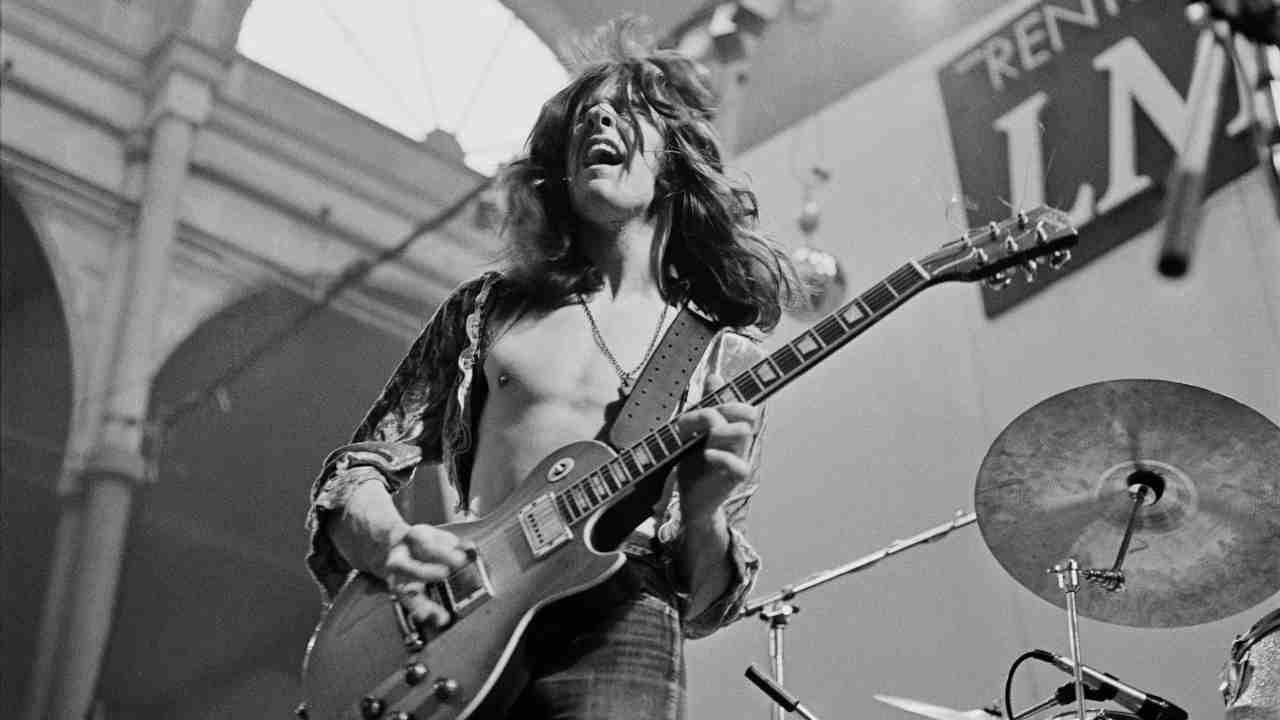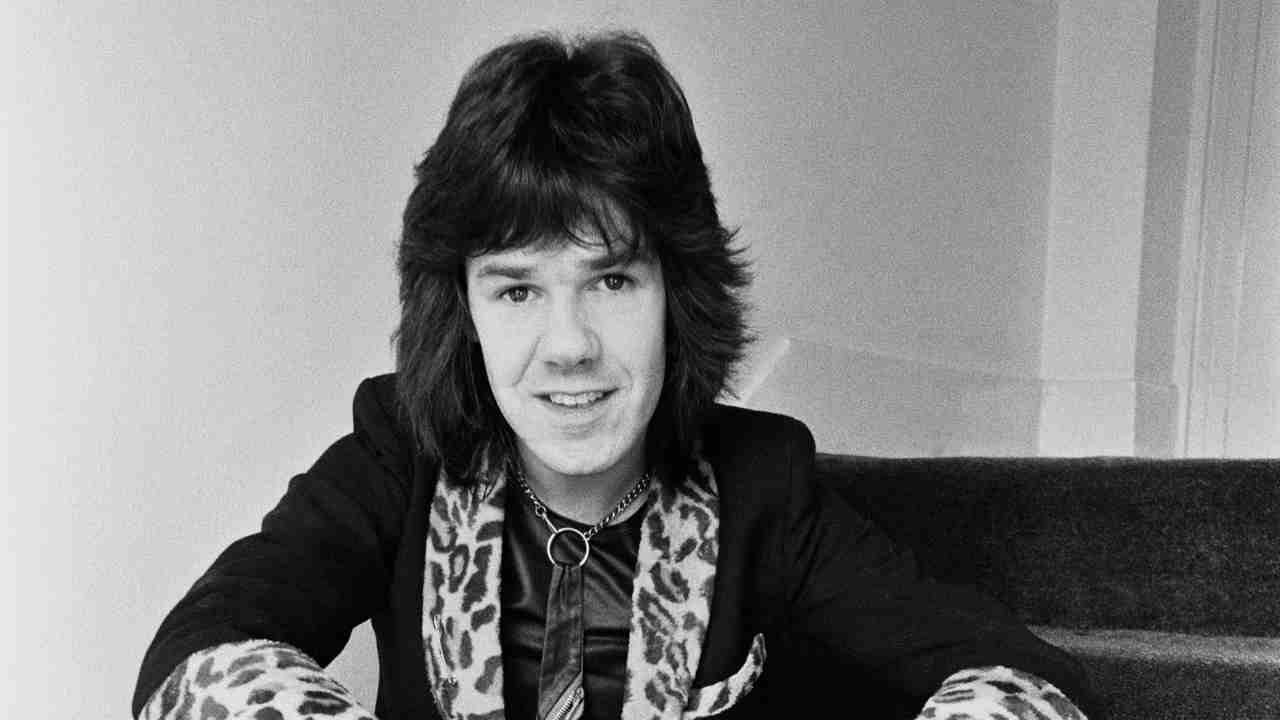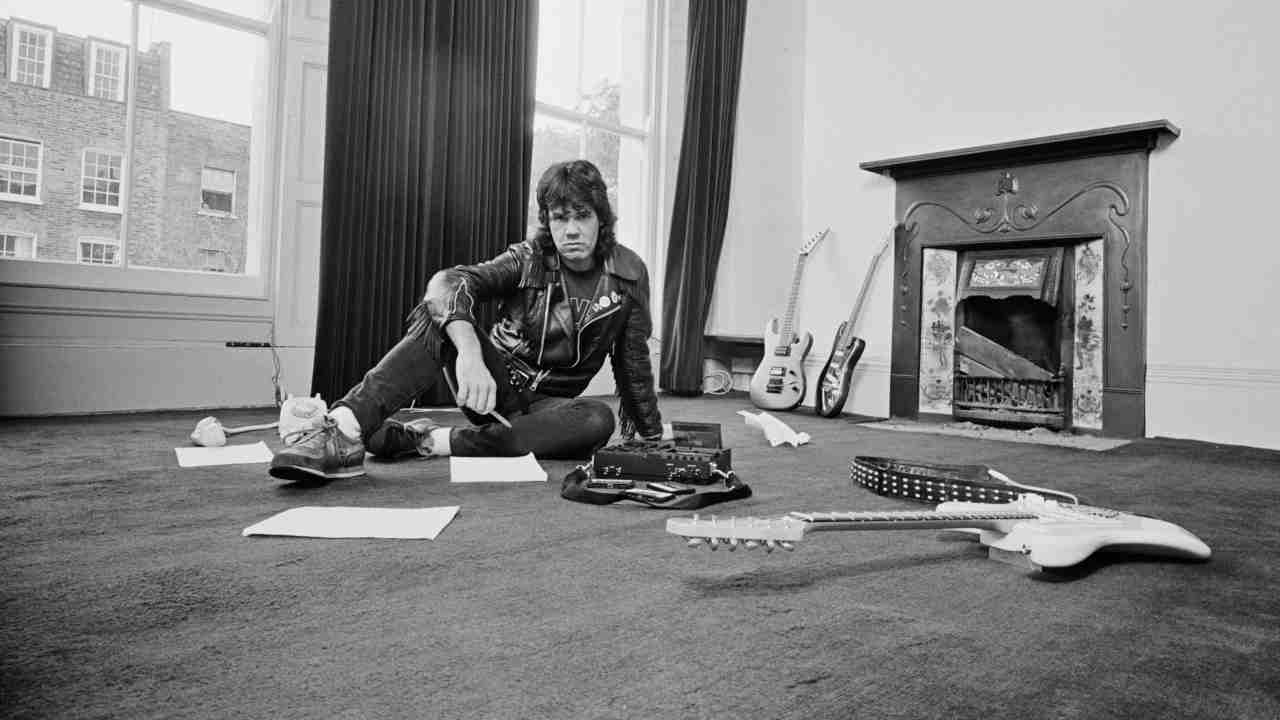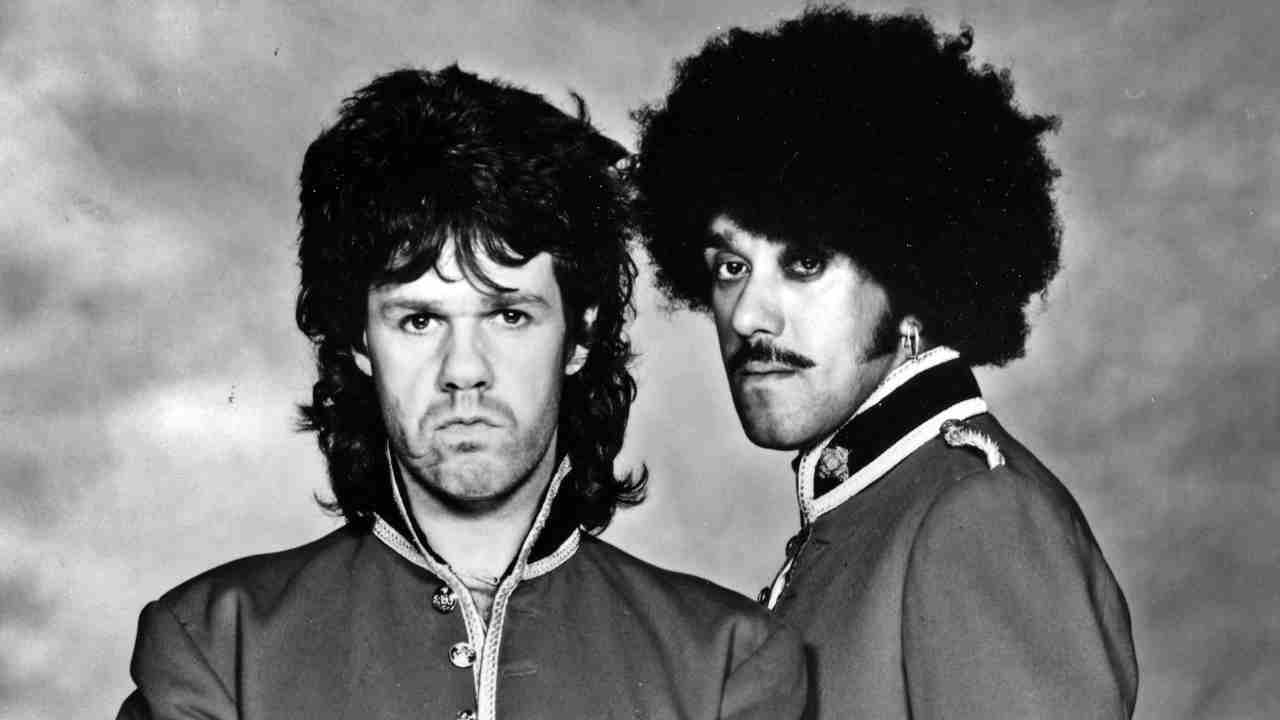In the summertime of 1984, Gary Moore was 32 and dwelling off his status as one of many biggest guitarists in Britain. However so what? He’d been listening to about how nice he was on guitar since he was 10 years previous and taking part in in Irish showbands. That wasn’t what stored him up at night time scowling.
Along with his disconcertingly scarred face (the results of a pub-fight glassing he was too wasted to recollect the following morning) and overeager-Spaniel hair (the consequence, widespread on the time, of long-haired 70s rockers updating their haircuts to accommodate the rock-is-dead 80s), Moore appeared a haunted determine, each on stage, the place his taking part in was intensely aggressive even at its most tender moments, and, particularly, off stage, the place even previous pals generally got here away a little bit frightened.
“Gary loved success,” guitarist Eric Bell, his boyhood good friend and predecessor in Skinny Lizzy, instructed me. “However I don’t know if he was ever actually comfortable. He was a perfectionist, nevertheless it was typically to his personal detriment.”
Moore walked out on his first skilled band, Skid Row, on the eve of a US tour, citing frustration with their “limitations”. He was 19 and “very combined up”. Or as Lizzy’s chief Phil Lynott stated: “Gary’s essentially the most opposite c**t I do know.”
Belfast-born Moore was the son of a protestant live performance promoter. His profession started in Dublin working with predominantly Catholic musicians. Naturally left-handed, he had taught himself to play right-handed. “He was at all times trying present horses within the mouth,” stated Lynott.
Moore shared a bedsit in Dublin with Lynott, who was three years older and a lifetime more durable, having grown up the one black child in class. Moore noticed Lynott as “like an enormous brother. He would cook dinner breakfast and take me to one of the best market stalls to purchase low cost stage garments”.
Lynott had fashioned Skinny Lizzy, that includes guitarist Bell, in ’69. They launched their self-titled debut album in ’71 and relocated to London.
Moore fashioned his personal group, the Gary Moore Band, whose debut album, Grinding Stone, got here out in ’73. Not like Lizzy’s heightened mix of Irish roots music, Gaelic poetry and the brand new electrical rock, Grinding Stone was a heady brew of Jeff Beck Group blues, Mahavishnu Orchestra fusion and the Allman Brothers. It was neither a business nor vital hit.
That very same 12 months, Lizzy broke by means of with their wised-up model of Whiskey In The Jar: No.1 in Eire, No.6 within the UK. However their subsequent album was their third flop in a row. When a disillusioned Bell walked out after a foul acid journey on stage, Moore appeared the apparent alternative. He jumped on the probability, disbanding the Gary Moore Band on the spot. True to type, nevertheless, Moore ditched Lynott and Lizzy after one flop single, Little Darling, which had Moore’s Beck-inspired fireworks on full show.
“Gary at all times had his personal factor happening,” says Lizzy drummer Brian Downey. “He didn’t see himself taking part in second fiddle to anybody, not even Phil.”
Possibly Moore had merely grown impatient with Lizzy’s ‘limitations’, as a result of his subsequent musical transfer was to hitch jazz-rock drummer Jon Hiseman in Colosseum II, a prog-oriented, primarily instrumental band that included keyboard participant Don Airey and bassist Neil Murray, future go-to session guys for each main British band of the 80s, together with numerous Gary Moore albums. Between 1976 and ’78, Moore co-wrote, performed lead guitar and sometimes sang on 4 Colosseum II albums. The beard-stroking plaudits had been many; the report gross sales pitifully few.
When Brian Robertson, who with Scott Gorham had changed Moore in Lizzy, minimize his hand so badly in a barroom struggle that it was thought he may by no means play guitar once more, Moore, at Lynott’s urging, agreed to take Robbo’s spot for a 1977 US tour with Queen. The second Colosseum II album had simply been launched, however Lizzy had been big on the time and, Gary confessed: “I discovered the concept of a few months of five-star accommodations and limos very interesting.”

When, in August 1978, fiery Robbo talked himself out of the band once more, Lynott instantly phoned Moore and instructed him he was again, no arguments allowed.
“When Gary left Colosseum II he didn’t even inform me,” says Airey. “Then I used to be doing a Black Sabbath session and I heard Gary was within the next-door studio. I went in and there he was in a white satin jacket, white trousers, flowery shirt.
“He was embarrassed to see me. So we by no means talked about him leaving. I stated: ‘Proper, I higher get again to Ozzy. See you quickly, eh?’ Then I didn’t see him once more for 2 years.”
The following 9 months turned Gary Moore into the most popular guitarist within the coolest rock band within the nation. Black Rose, Moore’s solely full Lizzy album, included three hit singles and went to No.2. The sight of them on The Kenny Everett Video Present blasting out Ready For An Alibi whereas draped in Scorching Gossip dancers helped set up Moore as an improve on Robbo. Moore held the identical menace, however had extra flash; scar-faced white lightning in skintight pants and gangster shades.
This was a brand new profession peak for Moore. He’d recorded a solo album, Again On The Streets, that featured each Lynott and Downey. Lynott and Downey additionally joined for what grew to become the album’s hit single, Parisienne Walkways. Sandwiched within the UK chart between Ready For An Alibi (No.9) and Do Something You Need To (No.14), Parisienne Walkways (No.8) was extra than simply pop-catchy – it was rock-immortal.
It was additionally in 1979 that Moore met former Deep Purple singer/bassist Glenn Hughes. Lizzy had been in Los Angeles, the place Hughes now lived, readying for a US tour. Scott Gorham launched them at LA’s numero-uno rock star hangout, the Rainbow, and by the tip of a really lengthy night time they had been greatest buds until the tip.
When, 5 months later, Moore stormed off stage after Lizzy’s set in entrance of 63,000 on the Day On The Inexperienced Competition in San Francisco, it got here as a shock to everybody. Besides Moore.
“It acquired to the purpose the place the get together after the present was extra essential than the present itself,” Eric Bell says.
When Lynott was so wasted he started forgetting lyrics, Moore determined he’d sufficient.
“There was by no means any half-measures with Gary.” Bell says. “Such a pleasant man on our personal, laughing and joking. But when he didn’t like one thing he’d quickly let you know to fuck off.”
With Moore hiding out at Hughes’s place, AWOL from Lizzy, the 2 talked about beginning their very own band, to be referred to as G-Power – geddit?
The self-titled G-Power album, launched in Could 1980, was closely tipped for the highest however sank with out hint, helped on its method by the truth that Hughes was nowhere to be discovered on it – not instrumentally, not vocally, not even any co-writer credit. The 2 Gs had fallen out after a closely coked-and-boozed Hughes tumbled over a desk at his birthday celebration and Moore had laughed. They didn’t communicate once more for years.

Moore was used to folks he labored with smoking dope and snorting coke; it was the 70s. However regardless of an over-fondness for downers when he was youthful, Moore didn’t do medication. He was a drinker. So he tolerated Hughes’s coke behavior. Hughes recollects: “Gary didn’t inform me to not do it till 1984, after I was correctly excessive round him.”
After G-Power there was discuss of hooking up with Ozzy, who’d been sacked from Sabbath. However Moore didn’t need to be someone else’s guitarist any extra. Born underneath the signal of Aries, the ram. Zodiac aspect: Fireplace. Signal ruler: Mars. Gary Moore was a natural-born chief.
“Gary at all times hogged the stage,” Downey says. “Even in Skinny Lizzy. Phil was the chief – besides when Gary joined. Now it was like we had two leaders, which wasn’t very intelligent.”
Moore returned to London, and in 1982 launched his second solo album, Corridors Of Energy, one other expertly dealt stack of playing cards with Moore again on lead vocals. However his status within the UK was nonetheless because the disgraced Skinny Lizzy guitarist. The album barely scratched the High 30.
Hughes additionally staged a comeback in 1982, teaming up with super-god American guitarist Pat Thrall to create one of many nice misplaced masterpieces, the album Hughes/Thrall.
“Gary was a large Hughes/Thrall fan,” Hughes says. “He’d fully forgotten concerning the G-Power incident.”
In the summertime of ’84, Moore was touring US arenas opening for Rush, earlier than coming ‘dwelling’ in August to look on the Monsters Of Rock pageant at Fortress Donington. His newest album, Victims Of The Future, had discovered a profitable method that fitted the Kerrang! crowd – guitar-heavy rock blended with American-flavoured pop-metal – and had a woulda-coulda-shoulda hit within the energy ballad Empty Rooms. It was his first UK High 20 album, regardless of Empty Rooms failing to succeed in the High 50. A primary headline solo present at London’s Hammersmith Odeon adopted. Then a headline solo Japanese tour.
With every week to kill in LA on the Rush tour, Moore had organized to remain at Hughes’s palatial Northridge mansion. The one snag was that his host was now a full-time, pipe-sucking crack addict. Hughes “put the pipe down” for just a few days whereas he showered, shaved and tried to “appear like a standard man – for Gary”.
The phantasm held lengthy sufficient to influence Moore that one other team-up with Hughes may work. So the seeds had been sewn for what would develop into Moore’s pinnacle 80s solo album: Run For Cowl.
There could be extra albums to come back on which Moore included trad-Irish rhythms, pure American blues, burlesque pop-electronica, even drum’n’bass into his sound, however he by no means made one other true-blue rock album like Run For Cowl. He’d walked out.

When Hughes flew into London to start work, Moore’s supervisor insisted that Glenn lay down some collateral. “In case I fucked up.” They took one in all his automobiles, a black Volvo he stored as a runaround. In return, Hughes was given at a luxurious flat to remain in whereas the 2 started writing materials. Materials that Hughes would later obtain no credit score for, he defined, as a result of Moore “managed each side – from the syncopation of your bass, to what notes you play, to what you sing”.
As soon as, Hughes screamed at him: “Why don’t you play the fucking bass your self?” So Moore did.
Moore adored Hughes’s singing voice, and determined all lead vocals could be break up between them 50-50. Hughes would ultimately sing lead on 4 of the album’s 10 tracks.
Moore was such a Hughes/Thrall fan, in accordance with Hughes, that the title observe, Run For Cowl, was “mainly a rip-off of I Acquired Your Quantity”, the opening observe on Hughes/Thrall. In his 2011 memoir, Hughes writes: “I Acquired Your Quantity was an enormous affect on Gary. You’ll be able to positively hear it on Run For Cowl.”
It was true, particularly the tracks Hughes sings on, just like the strutting Attain For The Sky or the swaggering Nothing To Lose or, better of all, the sassy All Messed Up. Even the freshly frosted Empty Rooms shone like new.
However with Hughes jonesing for crack and Moore oblivious to his ache, the stress within the studio shortly escalated. Hughes would anticipate Moore to depart for the weekend, then hit the Embassy Membership in Mayfair with Lemmy, who “may deal with his medication, I couldn’t”. Hughes was additionally midnight feasting, and at one level tipped the scales at 220 kilos/15 and a half stones.
He had initially sung lead on the brand new Empty Rooms. When Moore’s supervisor insisted Hughes drop a few pounds and get his enamel mounted to ensure that them to carry out it on High Of The Pops, it led to a full bodily examination. When blood-test outcomes revealed the hideous reality of what Hughes had been as much as in his spare time, he recalled: “I used to be on the following fucking airplane. There was no dialog about it. I used to be gone.”
Evidently the Hughes model of Empty Rooms by no means noticed the sunshine of day. When a nonetheless disgruntled Moore ‘revealed’ in an interview that Hughes had a meals dependancy, calling him Mr Creosote, “it actually damage me”, Hughes confessed. Moore was “not a person to fuck with. He didn’t have the scars on his face for nothing.”
One other estranged good friend that Run For Cowl would reconnect Gary with was Phil Lynott. Moore had guested one night time on Lizzy’s official farewell tour the 12 months earlier than. Lynott spent all of ’84 making an attempt to get a brand new band, Grand Slam, off the bottom, however there have been no takers. In the meantime, it was widespread data that Lynott was filling the void with heroin.
When Moore launched into a four-night run in Eire that Christmas – two in Belfast, two in Dublin – he invited his ‘large brother’ to come back on for the encores every night time and do Parisienne Walkways. Again in London, in January ’85, Moore invited Lynott to hitch him within the studio to report a observe he wished them to do collectively. It was referred to as Out In The Fields, a music about equality based mostly on the Troubles in Northern Eire.
Phil, although, had endured a “heavy Christmas” and was in dangerous form. Moore as soon as described him as “some of the charismatic and charming fellers you could possibly ever hope to fulfill, an actual Irish gentleman”, shortly including: “Except you bought on the unsuitable facet of him, after all, after which he may very well be an actual fucker.”
The Lynott within the studio that day, nevertheless, was completely different. “Phil within the early days was at all times the primary man within the studio and the final man out. Such a workaholic. However when the medication kicked in I noticed an enormous change. He’d begin every day with a spliff in a single hand and a glass of whisky within the different.”

Shedding Skinny Lizzy had affected Lynott deeply. Now his spouse, Caroline, had left him too. “With out his spouse and his youngsters, Phil was dwelling on his personal on this large home with a bunch of leeches,” Moore seethed. “Sellers and smack-heads.”
Moore begged. “Please, Phil… Saying I cherished him and the way I actually wished him to cease. He’d be like: ‘Oh yeah, I’m gonna do it however I’m not gonna do it in a single day.’ Then the following day he’d be again to his previous tips.”
When the Out In The Fields single went High 5 in June, it not solely remodeled Moore’s profession, it additionally opened doorways to a brand new solo deal for Lynott. “John Sykes stated: ‘Oh, it’s very nice of you to work with Phil,’” Moore recalled. “However I didn’t see it as doing Phil a favour. It was his packaging of the entire thing which helped to make it such an enormous hit. The army uniforms we wore in the course of the promotion had been Phil’s thought. He had a present for advertising, an ideal sense of the right way to promote to an viewers.”
When Run For Cowl was launched in September, Moore toured the UK, and Lynott guested on Parisienne Walkways and Out In The Fields at Manchester Apollo and each nights at Hammersmith Odeon. “No strain, no onerous work, no trouble, however loads of limelight and an ideal excuse to get wasted each night time. I knew what he was as much as,” Moore stated.
The brand new Empty Rooms was the follow-up single to Out In The Fields. It reached No.23, didn’t develop into the hit that Moore thought it ought to have been.
“Gary was so proficient I believe it truly haunted him,” says Don Airey. “As soon as he acquired the guitar on, he appeared to attach. However he wasn’t actually in charge of what was coming by means of him. He couldn’t cease it. He was a genius, actually. That type of factor at all times comes at a worth.”

